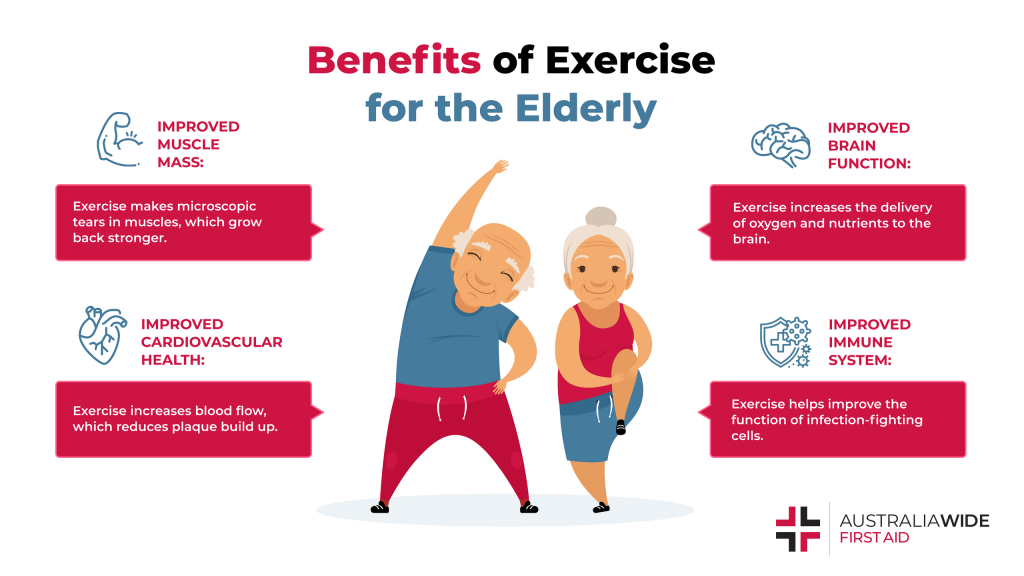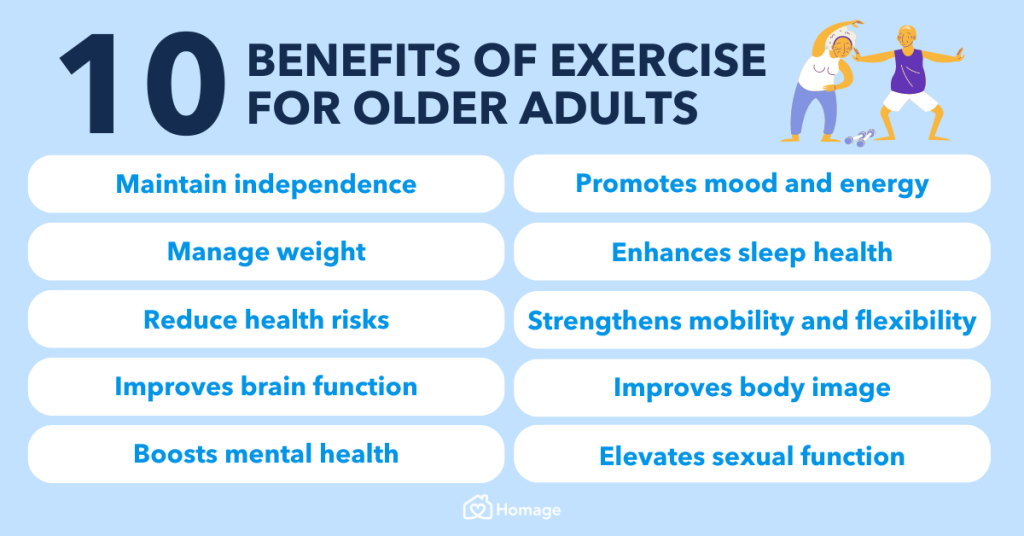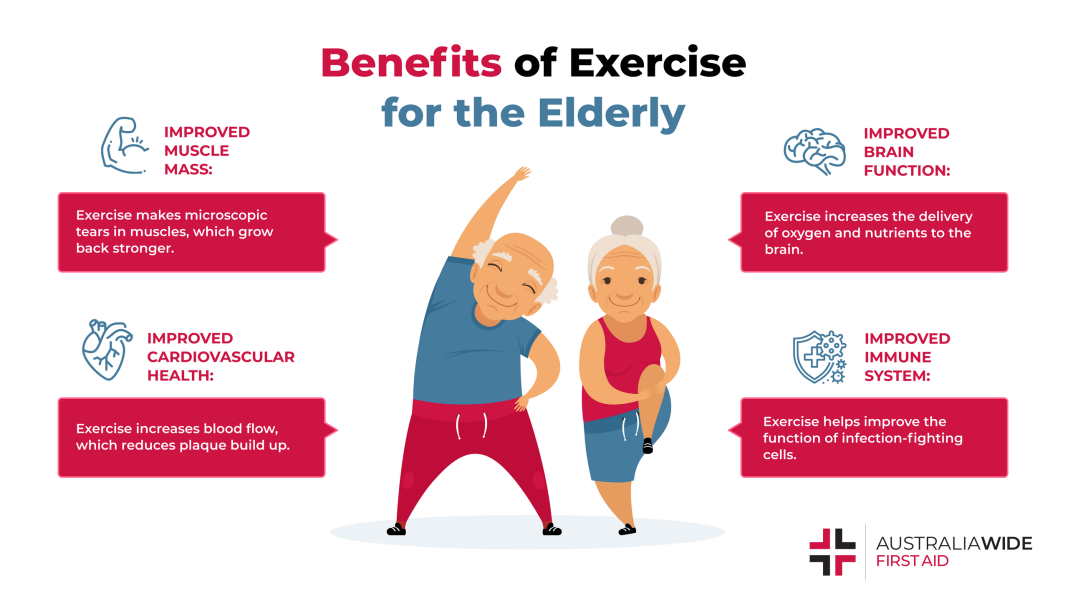Alright, here’s your requested piece:
Feeling a bit older these days? Well, here’s some good news for you: exercise can work wonders when it comes to aging! Yep, you heard it right – breaking a sweat and staying active can bring a whole bunch of benefits. Getting regular exercise not only helps you maintain a healthy weight, but it also strengthens your muscles and bones, reduces the risk of chronic diseases, improves your mood, and gives your brain a boost. Who would’ve thought that something as simple as exercise could do all that?
As you age, staying physically active becomes even more important. Regular exercise can help you stay independent and maintain your daily activities without a hitch. And the best part? You don’t need to run a marathon or pump iron like a bodybuilder to reap the rewards. Even going for a daily walk, swimming, or gardening can make a big difference. So, why not lace up those sneakers and get moving? Your body and mind will thank you for it!
The Benefits of Exercise for Aging
When it comes to aging, maintaining an active lifestyle becomes increasingly important. Engaging in regular exercise can have numerous benefits for individuals of all ages, but it becomes particularly crucial as we grow older. Exercise not only contributes to physical health but also enhances cognitive function, reduces the risk of chronic diseases, improves mood and mental well-being, enhances mobility and balance, helps maintain a healthy body weight, strengthens the immune system, increases energy levels, improves sleep quality, and ultimately enhances overall quality of life.

This image is property of www.australiawidefirstaid.com.au.
Improved Physical Health
One of the most immediate benefits of exercise for aging individuals is the improvement in physical health. Regular physical activity has been shown to increase cardiovascular fitness, leading to a stronger heart and healthier blood vessels. This, in turn, reduces the risk of cardiovascular diseases such as heart disease and stroke. Additionally, exercise helps to enhance muscle strength and flexibility, allowing for better mobility and decreased risk of injuries. It also improves bone density, reducing the likelihood of developing conditions like osteoporosis. Moreover, exercise improves respiratory function, helping to maintain healthy lungs and preventing respiratory diseases. Finally, regular exercise can significantly reduce the risk of falls and fractures, contributing to overall physical well-being.
Enhanced Cognitive Function
Exercise doesn’t just benefit the body; it also has a profound impact on our cognitive function. Engaging in regular physical activity has been shown to improve memory and mental clarity, reducing the risk of cognitive decline as we age. Exercise also enhances focus and attention, promoting sharper cognitive abilities. Moreover, research suggests that exercise helps improve problem-solving skills and enhances overall cognitive performance. By incorporating exercise into our routine, we can keep our minds sharp and mentally agile as we navigate the aging process.
Reduced Risk of Chronic Diseases
Chronic diseases often become more prevalent as we age, but lifestyle choices can play a significant role in their prevention. Regular exercise helps lower the risk of heart disease by improving cardiovascular health, reducing cholesterol levels, and controlling blood pressure. Furthermore, staying physically active decreases the likelihood of developing type 2 diabetes by promoting proper insulin sensitivity and glucose regulation. Exercise has also been linked to a decreased risk of certain cancers, such as breast and colon cancer. Additionally, exercise aids in the management of hypertension, a common condition among older adults, and plays a crucial role in preventing the development of osteoporosis.
Improved Mood and Mental Well-being
Exercise is not only beneficial for physical health and cognitive function, but it also has a profound impact on our mood and overall mental well-being. Engaging in physical activity promotes the release of endorphins and mood-boosting hormones, such as serotonin, dopamine, and norepinephrine. These natural feel-good chemicals uplift our spirits, leaving us feeling happier and more content. Regular exercise has been shown to reduce symptoms of anxiety and depression, making it an effective adjunctive therapy for mental health conditions. Furthermore, exercise enhances self-esteem and confidence, allowing for improved emotional resilience. It also serves as an effective stress management tool, providing a healthy outlet to release tension and clear the mind.

This image is property of healthstarhomehealth.net.
Enhanced Mobility and Balance
Maintaining mobility and balance is a crucial aspect of healthy aging. Regular exercise can help individuals improve their flexibility and range of motion, allowing for increased independence in daily activities. By engaging in activities that promote coordination and balance, such as yoga or tai chi, older adults can significantly reduce their risk of falls and injuries. This improved physical stability not only enhances one’s safety but also ensures continued autonomy in performing everyday tasks.
Maintaining Healthy Body Weight
As we age, it becomes increasingly important to manage our body weight to prevent the onset of obesity-related health issues. Regular exercise, combined with a balanced diet, plays a vital role in calorie burning and weight management. Engaging in physical activity helps maintain a healthy body weight by increasing muscle mass, which, in turn, boosts the metabolic rate and promotes more efficient calorie burning. By incorporating exercise into our daily routine, we can manage our weight effectively and reduce the risk of weight-related health conditions such as cardiovascular diseases, diabetes, and joint problems.

This image is property of www.homage.com.my.
Strengthened Immune System
A strong immune system becomes crucial as we age, as it helps protect against infections and diseases. Regular exercise has been found to strengthen the immune system by increasing the circulation of immune cells throughout the body. This enhanced immune function reduces the susceptibility to infections, such as the common cold and flu, and helps to prevent the development of more severe illnesses. Additionally, exercise has been shown to improve the recovery process when faced with an illness, allowing individuals to bounce back more quickly and resume their daily activities.
Increased Energy Levels
Feeling fatigued and low on energy can be both physically and mentally draining, ultimately impacting our quality of life. Regular exercise has the remarkable ability to boost energy and stamina levels. Through increased physical activity, the body becomes more efficient at utilizing oxygen and nutrients, leading to improved energy production. Individuals who engage in regular exercise often report reduced feelings of fatigue and lethargy, allowing them to tackle daily tasks with greater vigor and productivity.

This image is property of www.shelden-healthcare.co.uk.
Improved Sleep Quality
Sleep is vital for our overall well-being, and aging can sometimes disrupt our sleep patterns. However, exercise has been shown to have a positive impact on sleep quality. Regular physical activity helps regulate our sleep patterns, enabling us to fall asleep more easily and achieve better sleep duration and quality. By engaging in exercise earlier in the day, we can promote increased relaxation and decrease restlessness at bedtime, ultimately leading to a more restful and rejuvenating sleep.
Enhanced Quality of Life
Ultimately, all the benefits mentioned above contribute to an enhanced quality of life as we age. Regular exercise promotes overall happiness and life satisfaction, primarily due to improved physical health, mental well-being, and increased energy levels. By participating in physical activities, we open ourselves up to new experiences and hobbies, fostering a sense of adventure and engagement with the world around us. Furthermore, exercise often provides opportunities for social connections and new relationships, fostering a sense of community and support. By prioritizing exercise and incorporating it into our daily lives, we can age gracefully and enjoy a higher quality of life.
In conclusion, exercise is a powerful tool that can significantly benefit aging individuals. From improved physical health and enhanced cognitive function to reduced risk of chronic diseases and improved mood, exercise offers a myriad of advantages. It enhances mobility, helps maintain a healthy body weight, strengthens the immune system, increases energy levels, improves sleep quality, and ultimately improves overall quality of life. So, lace-up those sneakers, find activities you enjoy, and make regular exercise a priority – your body and mind will thank you for it as you gracefully embrace the aging process.



